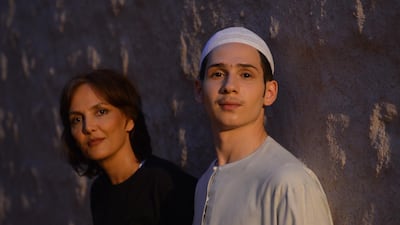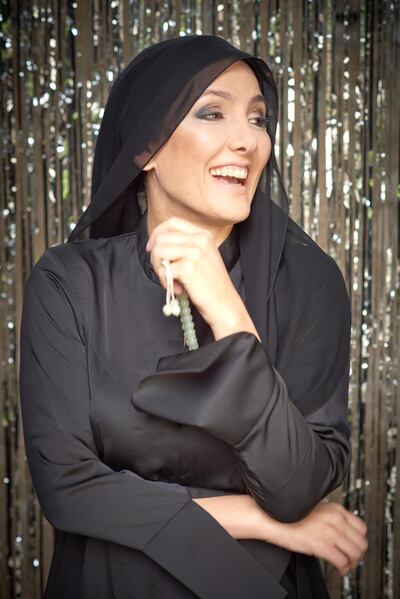It's been more than two years since debut filmmaker Layla Kaylif picked up the US$100,000 (Dh367,300) IWC award at the 2015 Dubai International Film Festival for her script The Letter Writer. Last week, she finally wrapped shooting the film following a 24-day production in Dubai.
It’s been a long process, and one that ultimately meant Kaylif did not receive the full $100,000 from IWC, as she did not deliver a completed film in time to meet the award’s contractual requirements. However, she insists the wait was worth it. “I basically spent the time raising money and finding someone here on the ground who could produce a film on my budget,” she explains. “I didn’t want to work with established financing houses, although I had some offers, because I wanted total creative control, so I had to wait for the right circumstances.”
That came in the form of producer Chris Buschek, who previously worked on the Dubai shoot of Star Trek Beyond, and for whom Kaylif has nothing but praise. "Chris put together an amazing crew and ran the shoot for me," she says. "Some of the crew members were saying they'd never had such a pleasurable experience on set. It was all done very indie style – I ran the production from an office in my house, the prep time was very short, but there was a lot of goodwill and I had the best crew in every department."
With the right crew in place, the next challenge was to find the right location. The film, which Kaylif describes as an “imaginary prequel” to her parents’ marriage, is set in Trucial States-era Dubai and follows the story of a teenage “letter writer” – an educated young man who writes letters for illiterate members of the community.
One of his clients is an Indian merchant who wants to send letters to the British object of his affection, but the letter writer also becomes besotted. Kaylif was on the lookout for a suitably historic area of the city in which to set the film. “We were initially going to use Bastakiya [Dubai], even though it wasn’t ideal as they have all the electric floor lights which aren’t exactly authentic,” she says. “Then my father stumbled across Meraas’ Al Seef development, where they’ve basically reconstructed an old Dubai neighbourhood. He was jumping for joy.”
Despite good fortune in assembling the right crew and finding the perfect location, Kaylif says there were still many challenges for an indie filmmaker working in Dubai. “Funding was a massive struggle,” she says. “There’s a strange paradigm here – it’s very hard to raise funding, but also more expensive to film as it’s a commercially focused industry. Shooting in the UK, someone who usually worked on ads for big companies wouldn’t then charge the same rate for an indie, which is standard practice here, so it’s a very challenging environment.”
Even with commercial challenges met, Kaylif says further trials came in the form of regulation. “There were still a lot of hoops to jump through in terms of clearances and approvals,” she says. “I was working on approvals and so on for about five years to get this made, so it’s really not an ideal environment to be an indie filmmaker, it’s not an easy process at all, even if the film and the script appear to be pretty innocuous.”
Kaylif will head back to her second home in London for post-production, where she will work alongside Dutch-Palestinian director Hany Abu Assad’s editor Eyas Salman, as well as using her own skills as a singer songwriter for the film’s soundtrack.
The director hopes that focusing on the movie’s music could help to set it apart from other films from the region when it finally releases. “I’m not sure why films from this part of the world don’t seem to do well commercially, but I remember having a fascinating conversation with the head of [now defunct distributor] Fortissimo, and I told him I was a singer songwriter, but I was thinking of making a film. He said to me, ‘Make sure you have a really good song to promote the film.’ That struck me as really interesting and stayed with me,” Kaylif explains.
“There is cinema from this part of the world that has an audience – Palestinian cinema does, Iranian cinema does, but honestly, Emirati cinema really doesn’t have an international audience, and the audience at home is so small you’re left in a position where you can’t sell it at home and you can’t sell it abroad. Hopefully, there was something in that advice.”
Perhaps there was – Kaylif has already received interest from distributors in both the Mena region and Europe, though she admits the remainder of the film's journey remains an unknown quantity to her. "It's honestly really difficult looking through all the footage to even know if a film is going to work," she says. "The odds are really stacked against you making something that's going to work because there are so many different elements, and so much collaboration that all has to fall into place. "My sister's a producer so I could learn a bit there, but until it's finished I can honestly say I still don't know if it's going to work."
After such a difficult and uncertain experience, can we expect Kaylif to return to her singer/songwriter roots once the film is complete, or has she caught the film bug for good now? "As a songwriter you're always telling stories, and it's much more acceptable now to be a hybrid songwriter/filmmaker/whatever. There's not so many boxes you have to be put in," she says. "I've actually written scripts since I was 17. Nothing ever came of them, it was just something I did as a hobby. I went to drama school for a bit too, but never really wanted a career as an actor, though I do play a role as the mother in The Letter Writer. I just love to create things, and that's what I'll keep doing, whether it's songs, scripts, films, characters, as long as I'm creating, I'm happy."
In fact, whatever happens with her debut film, Kaylif insists she has already achieved her main goal – to create a film in a happy environment. “You hear so many stories about the terrible experiences people have on set, and there was no way I was going to do that. We can’t guarantee that the film will be successful, but we could at least guarantee an enjoyable experience. How can you make a film about love and acceptance when people are mistreated on set and everyone has an awful time? That was my primary aim. Now if the film works, then great. If not, we already won.”
_______________________
Read more:
Why the Trump and Merkel photo echoes a 15th century Baroque Italian masterpiece
Saudi censors pass 'The Message' – Kuwait initially bans the film
Exclusive: Sheikh Zayed movie producer: 'We will honour his inspirational life'
_______________________


